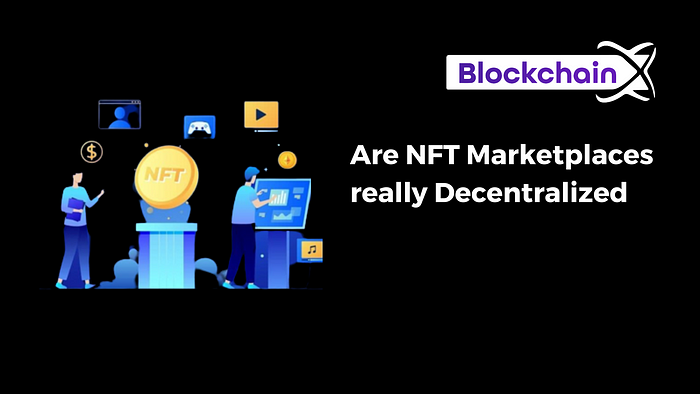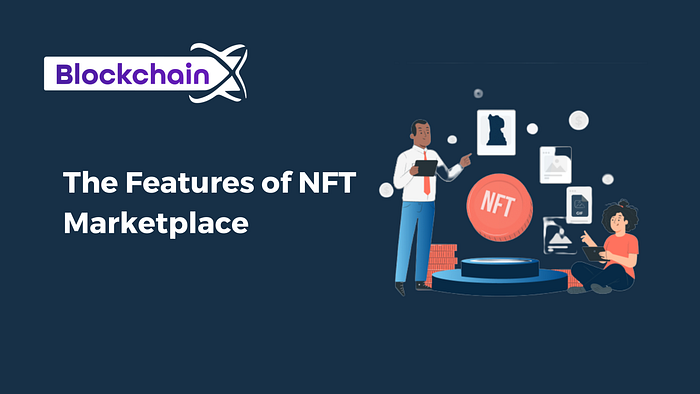The concept of decentralization can vary when it comes to NFT (Non-Fungible Token) marketplaces. While some NFT marketplaces claim to be decentralized, the extent of their decentralization can differ.
In general, NFTs are built on blockchain technology, which inherently offers decentralized properties. Blockchains like Ethereum and others are decentralized networks where transactions and data are recorded on a distributed ledger across multiple nodes or computers. This decentralized nature ensures that no single entity has complete control over the network.
However, when it comes to NFT marketplaces, the decentralization aspect can be more nuanced. While the underlying blockchain technology is decentralized, the platforms or marketplaces themselves may have varying degrees of centralization.

Some NFT marketplaces operate in a more centralized manner, where a central authority or organization controls key aspects of the platform, such as the listing process, transaction fees, and governance decisions. These platforms may still utilize blockchain technology for the creation, ownership, and verification of NFTs, but they have centralized control over the marketplace itself.
On the other hand, there are NFT marketplaces that strive for a higher degree of decentralization. These platforms aim to minimize or eliminate centralized control by leveraging smart contracts and decentralized protocols. They may use decentralized storage systems and allow users to directly interact with the blockchain without intermediaries. These marketplaces often incorporate governance models that enable community participation in decision-making processes.
It’s important to research and evaluate the specific NFT marketplace you are interested in to understand its degree of decentralization. Factors such as the governance model, ownership of assets, control over the platform, and transparency of operations can help determine the level of decentralization within a marketplace.
NFT (Non-Fungible Token) marketplaces serve as platforms where users can create, buy, sell, and trade NFTs. Here are some common features you can find in NFT marketplaces:
The Features of NFT Marketplace:

In general, NFTs are built on blockchain technology, which inherently offers decentralized properties. Blockchains like Ethereum and others are decentralized networks where transactions and data are recorded on a distributed ledger across multiple nodes or computers. This decentralized nature ensures that no single entity has complete control over the network.
However, when it comes to NFT marketplaces, the decentralization aspect can be more nuanced. While the underlying blockchain technology is decentralized, the platforms or marketplaces themselves may have varying degrees of centralization.

Some NFT marketplaces operate in a more centralized manner, where a central authority or organization controls key aspects of the platform, such as the listing process, transaction fees, and governance decisions. These platforms may still utilize blockchain technology for the creation, ownership, and verification of NFTs, but they have centralized control over the marketplace itself.
On the other hand, there are NFT marketplaces that strive for a higher degree of decentralization. These platforms aim to minimize or eliminate centralized control by leveraging smart contracts and decentralized protocols. They may use decentralized storage systems and allow users to directly interact with the blockchain without intermediaries. These marketplaces often incorporate governance models that enable community participation in decision-making processes.
It’s important to research and evaluate the specific NFT marketplace you are interested in to understand its degree of decentralization. Factors such as the governance model, ownership of assets, control over the platform, and transparency of operations can help determine the level of decentralization within a marketplace.
NFT (Non-Fungible Token) marketplaces serve as platforms where users can create, buy, sell, and trade NFTs. Here are some common features you can find in NFT marketplaces:
The Features of NFT Marketplace:

- NFT Creation: NFT marketplaces typically provide tools and interfaces for users to create their own NFTs. Users can mint their digital assets by uploading files such as images, videos, music, or any other digital content onto the marketplace platform.
- Buying and Selling: NFT marketplaces enable users to buy and sell NFTs. Sellers can list their NFTs for sale, set prices (fixed or auction-based), and specify the terms of the transaction. Buyers can browse through available NFTs, place bids, or purchase NFTs directly using cryptocurrency.
- Wallet Integration: NFT marketplaces often integrate with cryptocurrency wallets to provide a seamless experience for users. These integrations allow users to connect their wallets to the marketplace platform, manage their NFT collections, and facilitate transactions securely.
- Ownership and Authenticity Verification: NFT marketplaces utilize blockchain technology to ensure the uniqueness and authenticity of each NFT. The ownership of an NFT is recorded on a blockchain, providing a transparent and immutable record of ownership. This verification process helps establish the scarcity and provenance of NFTs.
- Royalties and Secondary Sales: Some NFT marketplaces incorporate royalty mechanisms, which allow creators to earn a percentage of future sales whenever their NFTs are resold on the marketplace. These royalties can provide ongoing revenue streams for creators even after the initial sale.
- Social and Community Features: Many NFT marketplaces emphasize community interaction by providing features like social profiles, commenting systems, messaging capabilities, and follower networks. These features enable users to engage with artists, collectors, and enthusiasts within the platform.
- Curation and Discovery: NFT marketplaces often have mechanisms to curate and highlight NFT collections or specific categories. They may feature trending or popular NFTs, offer search and filtering options, and provide tools for users to discover new and interesting NFTs.
- Decentralized Governance: Some NFT marketplaces incorporate decentralized governance models, allowing token holders or participants to have a say in platform decisions. This can include voting on platform upgrades, policy changes, or the inclusion of new features.
